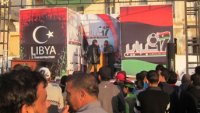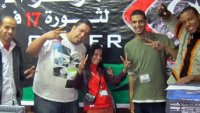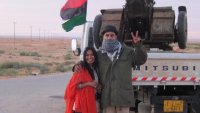News, April 2011
www.aljazeerah.info
Archives
Mission & Name
Conflict Terminology
Editorials
Gaza Holocaust
Gulf War
Isdood
Islam
News
News Photos
Opinion Editorials
US Foreign Policy (Dr. El-Najjar's Articles)
|
Editorial Note: The following news reports are summaries from original sources. They may also include corrections of Arabic names and political terminology. Comments are in parentheses. |
Heavy fighting in Misrata and Libyan mountains
By Lin Noueihed
TRIPOLI | Mon Apr 25, 2011, 6:41pm EDT
TRIPOLI (Reuters) -
Libya's rebel-held city of Misrata won no respite from two months of bitter siege as Muammar Gaddafi's forces bombarded the city and battled rebel fighters, despite pulling out of the city center.
Gaddafi's forces were also pounding Berber towns in Libya's Western Mountains with artillery, rebels and refugees said, in a remote region far from the view of international media.
Italy said its warplanes would join the British and French bombing of Libyan targets for the first time and NATO flattened a building inside Gaddafi's Tripoli compound, in what his officials said was a failed attempt on the Libyan leader's life.
Late on Monday, the "crusader aggressors" bombed civilian and military sites in Bir al Ghanam, 100 km (60 miles) south of Tripoli, and the Ayn Zara area of the capital, causing casualties, Libyan television said, without giving details. A Reuters correspondent heard explosions in Tripoli.
The report said foreign ships had also attacked and severed the al-Alyaf cable off Libya's coast, cutting communications to the towns of Sirte, Ras Lanuf and Brega.
But more than a month of air strikes did not appear to be tipping the balance decisively in a conflict increasingly described as a stalemate.
People in Misrata emerged from homes after daybreak on Monday to scenes of devastation after Gaddafi's forces pulled back from the city under cover of blistering rocket and tank fire, said witnesses contacted by phone.
Nearly 60 people had been killed in clashes in the city in the last three days, residents told Reuters by phone.
"BODIES EVERYWHERE"
Although rebels' celebrations of "victory" on Saturday turned out to be very premature, it was clear they had inflicted significant losses on government forces in Misrata.
"Bodies of Gaddafi's troops are everywhere in the streets and in the buildings. We can't tell how many. Some have been there for days," said rebel Ibrahim.
Rebel spokesman Abdelsalam, speaking late on Monday, said Gaddafi's forces were trying to re-enter the Nakl Thaqeel Road, which leads to Misrata's port, its lifeline to the outside.
"Battles continue there. We can hear explosions," he said by phone. He said Gaddafi's forces positioned on the western outskirts of the city had also shelled the road from there.
Another rebel spokesman, Sami, said the humanitarian situation was worsening rapidly.
"It is indescribable. The hospital is very small. It is full of wounded people, most of them are in critical condition," he told Reuters by phone.
U.S. officials said relief groups were rotating doctors into Misrata and evacuating migrant workers.
Mark Bartolini, director of foreign disaster assistance at the U.S. Agency for International Development, said aid organizations were aiming to create stocks of food in the region in case Libyan supply chains began breaking down.
Among the places in particular need of food aid were isolated towns in the Western Mountains, from where tens of thousands of people have fled to Tunisia from the fighting.
REFUGEES FLEE MOUNTAINS
"Our town is under constant bombardment by Gaddafi's troops. They are using all means. Everyone is fleeing," said one refugee, Imad, bringing his family out of the mountains.
NATO said its attack on the building in the Gaddafi compound was on a communications headquarters used to coordinate attacks on civilians. A Libyan spokesman said Gaddafi was unharmed and state television showed pictures of him meeting people in a tent, which it said had been taken on Monday.
Gaddafi's son Saif al-Islam said the Libyan government would not be cowed.
"The bombing which targeted Muammar Gaddafi's office today ... will only scare children. It's impossible that it will make us afraid or give up or raise the white flag," he was quoted as saying by the state news agency, Jana.
Italy said its warplanes would join British and French aircraft in carrying out bombing of Libya. Geographically the closest major NATO member state to Libya, Italy had until Monday provided bases and reconnaissance and monitoring aircraft only.
The surprise decision immediately opened a fissure in Italy's coalition government.
The African Union held separate talks on Monday with Libyan Foreign Minister Abdelati Obeidi and rebel representatives in Addis Ababa to discuss a ceasefire plan.
The rebels had earlier rebuffed an AU plan because it did not entail Gaddafi's departure, while the United States, Britain and France say there can be no political solution until the Libyan leader leaves power.
(Additional reporting by Guy Desmond and Maher Nazeh in Tripoli, Alexander Dziadosz in Benghazi and Sami Aboudi in Cairo; writing by Andrew Roche; Editing by Kevin Liffey)
Related News
Italy says air force can bomb Libya military targets
4:47pm EDT Analysis: West's caution on Syria jars with Libya action
10:21am EDT Libyan mountain refugees tell of fearsome assault
3:23pm EDT No invitation for Libya to Britain's royal wedding 9:55am EDT
Related Video
Gaddafi appears publicly hours after NATO attack
6:47pm EDT
NATO jets bomb Gaddafi compound Deadly bombardments in Misrata say rebels
Credit: Reuters/Louafi Larbi
Qaddafi Compound Hit in Fresh NATO Air Strikes
By Louise Hannah (video)News Wires (text)
REUTERS -
NATO forces flattened a building inside Muammar Gaddafi’s Bab al-Aziziyah compound early on Monday, in what his officials said was a failed attempt on the Libyan leader’s life.

Fair Use Notice
This site contains copyrighted material the use of which has not always been specifically authorized by the copyright owner. We are making such material available in our efforts to advance understanding of environmental, political, human rights, economic, democracy, scientific, and social justice issues, etc. We believe this constitutes a 'fair use' of any such copyrighted material as provided for in section 107 of the US Copyright Law. In accordance with Title 17 U.S.C. Section 107, the material on this site is distributed without profit to those who have expressed a prior interest in receiving the included information for research and educational purposes. For more information go to: http://www.law.cornell.edu/uscode/17/107.shtml. If you wish to use copyrighted material from this site for purposes of your own that go beyond 'fair use', you must obtain permission from the copyright owner.
|
|
|
|
||
|
||||||





